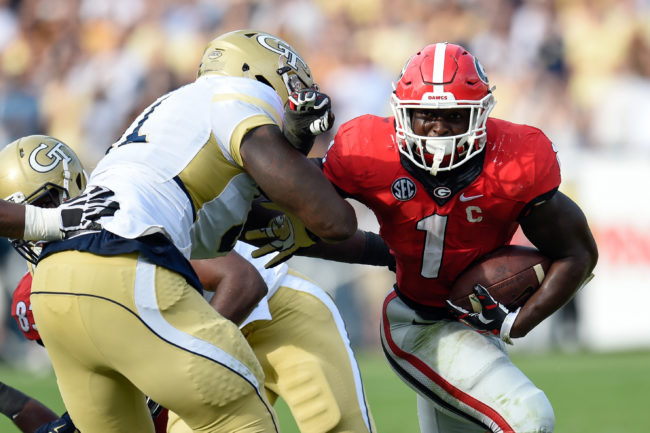
Is the Georgia/Georgia Tech rivalry in danger of becoming irrelevant?
The rivalry dubbed “clean, old-fashioned hate” has given way to indifference in recent years and is in danger of becoming irrelevant.
The annual showdown matching Georgia and Georgia Tech used to generate a lot of excitement for the state’s two major football programs and their fans, but it hasn’t as of late. It’s not really much of a rivalry anymore, with the consistently far deeper and more talented Dawgs dominating the series and having free run of the entire football-crazed state. UGA has won 13 of the last 15 meetings, including last year’s 13-7 decision in Atlanta, and is a 4.5-point favorite for Saturday in Athens.
The “rivalry” part of this series is becoming more distant by the year, as the latest generation of Tech students and younger alums are left to read about the good ‘ole days when their beloved Yellow Jackets, led by the likes of Pepper Rogers and George O’Leary, could consistently go toe-to-toe with their hated rivals located roughly 70 miles northeast of Atlanta.
Given the recent lopsided nature of the rivalry and the fact that the outcome rarely holds added significance, it could easily be argued that Georgia fans have more emotionally invested in SEC Conference games against the likes of Florida, Auburn and Alabama than they do in the annual contests against Tech of the ACC.
Just how much attention do you think this game against the Yellow Jackets would be getting this week if the Dawgs had reached the SEC Championship Game to face the Crimson Tide on Dec. 3? Oh, sure, coaches will always say the right things. But you can bet they would have already begun looking at some film of Alabama.
Other rivalries, such as Florida/Florida State and Clemson/South Carolina are further stoked because the schools almost always compete for the same players. Animus is automatically created when a highly regarded prospect chooses one school over the other, the fire fueled by fans with long memories and easy access to ridiculously partisan online message boards.
But that’s not the case for Georgia and Georgia Tech, who rarely compete for the same players because of schematic differences as well as academic ones. Yellow Jackets coach Paul Johnson has preferred his run-based triple-option offense since his arrival at The Flats in 2008, while the pro set offense that features a big-time tailback and 25 to 30 passes per game has always been the staple at Georgia.
Promising recruits dreaming of playing on Sundays for big NFL paychecks are far more likely to want to play in the haughty SEC rather than consider Tech, although the Yellow Jackets have been very successful at producing NFL-caliber wide receivers in recent years. Additionally, Johnson’s offense is predicated on smaller, quicker offensive linemen who can run and cut down their opponents rather than physically overwhelm them. Defensively, the schematic differences aren’t as pronounced, but the perceptions of the philosophies of the two schools couldn’t be more different.
Academics also figure into the equation as there are simply a number of athletes that Georgia recruits whom Tech can not because of the school’s rigorous academic slate. The Jackets regularly compete with the likes of Stanford, Notre Dame, Duke, Virginia, Northwestern, Rice and the like for the limited pool of talented high school football prospects who also happen to be strong students capable of withstanding Tech academically.
It means that Georgia Tech always has a considerably smaller margin of error in recruiting, and any misses readily become apparent on the field against a Georgia team that is always loaded with future pros. The results have been readily apparent in the series in recent years.
The games have remained somewhat competitive, as UGA’s 13 wins over the last 15 years have come by an average of just under 14 points per game, the outlier being the 51-7 beatdown of the Chan Gailey-led Jackets at Sanford Stadium in 2002 –the most lopsided game of the series.
But close isn’t quite good enough to sustain the intensity of a rivalry. And it hasn’t helped that the game has held little if any national significance in a while. Both teams enter this week’s game 7-4 and unranked.
Maybe some of the long-running bad blood between the schools remains.
But it hasn’t been clean, old-fashioned hate for a while.
